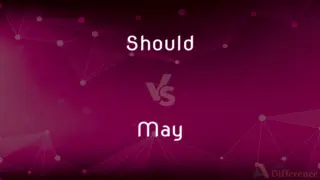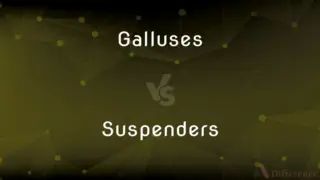Heresy vs. Witchcraft — What's the Difference?
By Tayyaba Rehman & Urooj Arif — Updated on May 16, 2024
Heresy refers to beliefs or opinions that deviate from established religious doctrines, while witchcraft involves the practice of magical skills and abilities, often associated with supernatural influence.

Difference Between Heresy and Witchcraft
Table of Contents
ADVERTISEMENT
Key Differences
Heresy pertains to beliefs or opinions that go against the official doctrines of a particular religion. This term is most commonly associated with Christianity, where heresy has historically been met with condemnation and punishment. Witchcraft, on the other hand, involves the practice of magical skills, often perceived as invoking supernatural powers.
Heresy focuses on doctrinal deviation and the spread of ideas that contradict established religious beliefs. The term historically signifies intellectual rebellion within a faith community. Witchcraft, however, is more about the practice and application of supposed magical powers, which is often considered malevolent or harmful by mainstream society.
Heresy has been a significant issue in the history of many religions, particularly Christianity, leading to numerous inquisitions and trials. In contrast, witchcraft has been subject to widespread persecution, particularly during the late medieval and early modern periods in Europe and North America, where alleged witches were often accused of causing harm or consorting with evil spirits.
Heresy typically involves theological and philosophical debate, with heretics often being educated individuals challenging the religious status quo. Witchcraft is more associated with folklore and superstitions, where individuals, often women, were accused of engaging in secretive and nefarious magical practices.
Comparison Chart
Definition
Deviant religious beliefs
Practice of magical skills
ADVERTISEMENT
Historical Context
Theological disputes, church schisms
Persecution, witch trials
Focus
Doctrinal deviation
Magical practices
Primary Association
Intellectual rebellion
Supernatural influence
Persecution Method
Inquisitions, excommunications
Witch hunts, executions
Compare with Definitions
Heresy
Belief or opinion contrary to orthodox religious doctrine.
The church condemned his views as heresy.
Witchcraft
The practice of magical skills, spells, and abilities.
She was accused of witchcraft and faced a harsh trial.
Heresy
An opinion profoundly at odds with what is generally accepted.
His radical ideas were considered heresy by the conservative group.
Witchcraft
Belief in or the performance of magic.
Witchcraft was often blamed for unexplained illnesses.
Heresy
The rejection of one or more established beliefs of a religious body.
His teachings were labeled as heresy by the religious authorities.
Witchcraft
The use of sorcery or magic.
Stories of witchcraft were common in the village.
Heresy
The act of maintaining such beliefs or opinions.
She was tried for heresy and faced severe punishment.
Witchcraft
The practice of attempting to influence people or events through supernatural means.
He studied ancient texts on witchcraft and spells.
Heresy
A theological or religious belief that deviates from established doctrine.
Early Christian councils dealt with numerous cases of heresy.
Witchcraft
The art of performing rituals and spells for various purposes.
The book contained old incantations and methods of witchcraft.
Heresy
Heresy is any belief or theory that is strongly at variance with established beliefs or customs, in particular the accepted beliefs of a church or religious organization. The term is usually used in reference to violations of important religious teachings, but is also used of views strongly opposed to any generally accepted ideas.
Witchcraft
Witchcraft is the practice of what the practitioner ("witch") believes to be supernatural skills and abilities, such as the casting of spells and the performance of magical rituals. Witchcraft is a broad term that varies culturally and societally, and thus can be difficult to define with precision.
Heresy
Belief or opinion contrary to orthodox religious (especially Christian) doctrine
Huss was burned for heresy
The doctrine was denounced as a heresy by the Pope
Witchcraft
Magic; sorcery.
Heresy
An opinion or a doctrine at variance with established religious beliefs, especially dissension from or denial of Roman Catholic dogma by a professed believer or baptized church member.
Witchcraft
Wicca.
Heresy
Adherence to such dissenting opinion or doctrine.
Witchcraft
A magical or irresistible influence, attraction, or charm.
Heresy
A controversial or unorthodox opinion or doctrine, as in politics, philosophy, or science.
Witchcraft
The practice of witches; magic, sorcery, or the use of supernatural powers to influence or predict events.
Wiccans believe in a modernised form of witchcraft.
Heresy
Adherence to such controversial or unorthodox opinion.
Witchcraft
Something, such as an advanced technology, that seems almost magical.
Heresy
(religion) a doctrine held by a member of a religion at variance with established religious beliefs
Witchcraft
The practices or art of witches.
Heresy
A controversial or unorthodox opinion held by a member of a group, as in politics, philosophy or science.
Witchcraft
Sorcery; enchantments; intercourse with evil spirits.
Heresy
An opinion held in opposition to the established or commonly received doctrine, and tending to promote a division or party, as in politics, literature, philosophy, etc.; - usually, but not necessarily, said in reproach.
New opinionsDivers and dangerous, which are heresies,And, not reformed, may prove pernicious.
After the study of philosophy began in Greece, and the philosophers, disagreeing amongst themselves, had started many questions . . . because every man took what opinion he pleased, each several opinion was called a heresy; which signified no more than a private opinion, without reference to truth or falsehood.
Witchcraft
Power more than natural; irresistible influence.
He hath a witchcraftOver the king in 's tongue.
Heresy
Religious opinion opposed to the authorized doctrinal standards of any particular church, especially when tending to promote schism or separation; lack of orthodox or sound belief; rejection of, or erroneous belief in regard to, some fundamental religious doctrine or truth; heterodoxy.
Doubts 'mongst divines, and difference of texts,From whence arise diversity of sects,And hateful heresies by God abhor'd.
Deluded people! that do not consider that the greatest heresy in the world is a wicked life.
Witchcraft
Adherence to or the practice of Wicca. In this sense the term does not necessarily include attempts at practice of magic, other than by prayers to the deities.
Heresy
An offense against Christianity, consisting in a denial of some essential doctrine, which denial is publicly avowed, and obstinately maintained.
A second offense is that of heresy, which consists not in a total denial of Christianity, but of some its essential doctrines, publicly and obstinately avowed.
Witchcraft
The art of sorcery
Heresy
Any opinions or doctrines at variance with the official or orthodox position
Heresy
A belief that rejects the orthodox tenets of a religion
Common Curiosities
Can heresy lead to excommunication?
Yes, heretics can be excommunicated from their religious communities.
Is witchcraft always harmful?
Witchcraft is often perceived as harmful, but not all practices are intended to cause harm.
What is heresy?
Heresy is a belief or opinion that deviates from established religious doctrines.
Were witch trials common in history?
Yes, especially during the late medieval and early modern periods.
Is heresy still relevant today?
Yes, in some religious contexts, heresy is still a significant issue.
Are there modern practices of witchcraft?
Yes, modern witchcraft practices exist, often associated with neo-pagan traditions.
Did heresy cause significant historical conflicts?
Yes, heresy led to numerous religious conflicts and schisms.
Can heresy be considered a crime?
In some religious contexts, heresy is treated as a serious offense.
Does witchcraft always involve rituals?
Witchcraft commonly involves rituals, though practices vary.
Is heresy always related to religion?
Yes, heresy specifically pertains to religious doctrines.
What is witchcraft?
Witchcraft involves the practice of magical skills and abilities.
Did heresy influence theological development?
Yes, heretical ideas often prompted significant theological debates.
Is witchcraft recognized legally in any country?
Some countries recognize witchcraft within certain cultural or religious frameworks.
Were accusations of witchcraft often based on evidence?
No, accusations were often based on superstition and fear.
Can heresy and witchcraft overlap?
Historically, individuals accused of heresy were sometimes also accused of witchcraft.
Share Your Discovery

Previous Comparison
Should vs. May
Next Comparison
Galluses vs. SuspendersAuthor Spotlight
Written by
Tayyaba RehmanTayyaba Rehman is a distinguished writer, currently serving as a primary contributor to askdifference.com. As a researcher in semantics and etymology, Tayyaba's passion for the complexity of languages and their distinctions has found a perfect home on the platform. Tayyaba delves into the intricacies of language, distinguishing between commonly confused words and phrases, thereby providing clarity for readers worldwide.
Co-written by
Urooj ArifUrooj is a skilled content writer at Ask Difference, known for her exceptional ability to simplify complex topics into engaging and informative content. With a passion for research and a flair for clear, concise writing, she consistently delivers articles that resonate with our diverse audience.











































